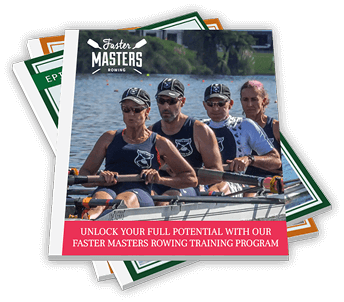How a Qualified Coach Can Accelerate Masters Rowing Performance
As a coach you have got good knowledge about how to row and how to TEACH rowing. But when it comes to working with masters athletes, somehow the boundaries and rules seem a little different.
Challenges coaches may face
You will have noticed some things which just don't line up with your previous coaching experience working with younger athletes.
Think about the people in your club group who are masters rowers.
- How do you feel about coaching people older than yourself?
- Are there differences between coaching men or women?
- Are there physical things you know some masters can’t do?
- Have members of your group had a heart attack? Should you push them hard in training?
These are all good questions and worthy of your attention BEFORE you start coaching masters.
Don't worry if you are already coaching masters, the rest of this article will help you understand some of the underlying things which may help you smooth out some of those wrinkles and improve your experience when working with masters athletes.
The process of learning as an adult
Let’s start with the basics - learning to row is a process and it is identical, however old you are. Each athlete advances at a speed which is unique to them but can be influenced by frequency of practice, athleticism and existing fitness. For masters this is just the same.
Masters span a very wide age range - from 27 to over 70 years old. And that is the REAL difference for this type of athlete. As you age through the decades, your physiology changes and so a coach needs to be familiar with what should be possible for each age group.
Within any masters rowing group will be beginners as well as very skilful advanced technicians. You are expected to coach them all. That brings obvious challenges as you may not be able to split the group into less- and more-skilled crews. If you can, that’s a good start because you won’t have half your group getting bored while others learn the basics.
There are methodologies which you can use to teach diverse skilled crews. These are based on our Framework for Skills Progress. In the same way that you probably learned to swim first doing ten metres, then 25 metres and 50 metres (and getting a nice swim badge for each distance), teaching masters rowing successfully can be better organised when the coach knows the Framework for Skills and can move individuals through each of the stages progressively.
That’s rowing technique. What about physiology?
As a general rule, rowers get slower with age through the masters categories. It’s not linear and depends on whether you are fit and if you learned to row in your youth or as an adult.
Setting appropriate expectations for yourself as a coach is important. Have you tried asking your group to do an erg test or undertake selections for regatta crews? We bet we know what happened.
First there were sideways glances between athletes, then someone spoke up and asked what would happen if they did not do the test, then they listened and when the test date came around.... crickets. Very few athletes showed up. And you're left thinking, What did I do wrong? Surely they want to be in the best boats with athletes of similar speed as themselves?
Some of the coaching tools you use for youth rowers are not accepted by masters. Their goals and expectations are not the same, nor can your goals be forced onto this group.
Many adults come to rowing having been injured out of another sport - they have weak knees from Netball, Basketball, Soccer or Rugby - maybe they’ve had a heart atrial fibrillation, or are a cancer survivor. As a consequence, their bodies are not as mobile, flexible or stable as youth athletes.
You need to be confident using our Rowing with Adaptations methodology when coaching masters. This helps you set appropriate and achievable goals, boat rig and training program rates / distances / times suitable for your group of masters rowers.
Wrangling a group of adults
When it comes to group organisation and structure, some compare masters to “herding cats”. That’s not possible - each cat goes in its own direction. But rowing is best done as a group and with a singular focus. As the coach, you are a leader as well as a collaborator.
That sentence alone sums up some of the apparently conflicting aims of masters rowing. It really is NOT like youth rowing.
Yet we bet you've tried a few things and found that the group doesn't always follow your lead or coalesce around a single goal.
Getting your group to cohere and agree to shared goals can be challenging. So part of the Masters Coaching Certification course is about group administration and management so that you can enable your members to all have a good rowing experience, and to select a focus and intensity that suits them this year. Next year, it may all be different.
In summary: The coaching focus learning points from this article are....
- Framework for skills progress
- Understand the rowing adaptations
- Running a group with diverse needs and skill differences
Masters Coaching Series
This part of a series of articles for masters rowing coaches to share guidance and insights which will help your coaching practice.
If you've found this article by accident, you can receive the rest of the series by email.

